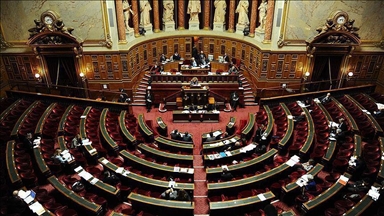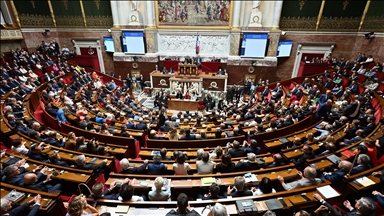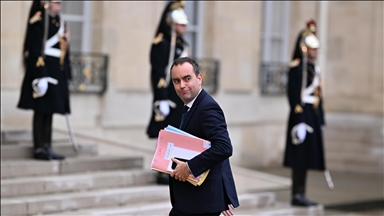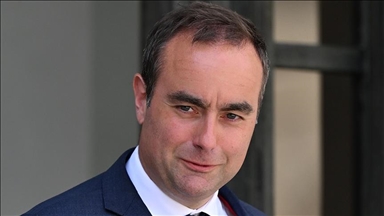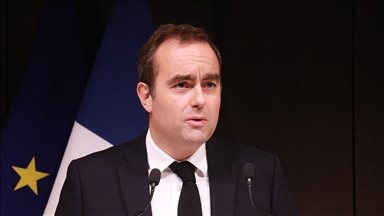OPINION - France's political crisis deepens as Lecornu faces confidence test
3 reshuffles in less than 2 years have left French executive fragile and reactive. Lecornu’s appointment offers short-term administrative stability but no clear political renewal
 French Parliament
French Parliament
- The author is a journalist.
ISTANBUL
French Prime Minister Sebastien Lecornu delivered his general policy speech to parliament on Tuesday, pledging to "share power with MPs" and confirming the suspension of the 2023 pension reform until January 2028 -- a dramatic concession aimed at averting a no-confidence vote later this week.
Lecornu, 39, one of French President Emmanuel Macron's most loyal allies, sought to present himself as a pragmatic unifier. "There are urgent measures to take without delay -- that is our duty," he told deputies, adding that "a crisis of regime will not happen."
He also promised to renounce the use of Article 49.3, which allows governments to pass budgets without a parliamentary vote, and announced plans for a national conference on pensions and work, as well as an exceptional contribution from the wealthy to finance sovereignty-linked investments. "We must prove that social justice and fiscal seriousness can go hand in hand," he said.
Opposition backlash and censure threats
Despite Lecornu's overtures, the opposition remained defiant.
- Jean-Luc Melenchon's France Insoumise (LFI) and Jordan Bardella's far-right Rassemblement National (RN) both filed motions de censure, accusing Macron's camp of "clinging to power" and calling Lecornu's suspension "a cynical maneuver."
- Eric Ciotti urged right-wing deputies to join a new "Union of the Right," promising to back the censure motion.
- The Socialist Party (PS), which holds the balance of power, has refused to support the far-left or far-right motions but warned it could present its own if Lecornu's promises remain "too vague."
If any of the motions pass on Thursday, Macron would be forced to appoint a fourth prime minister in less than three years, or dissolve parliament -- a move that risks boosting extremist parties on both sides.
A presidency under strain
Analysts say Lecornu's speech marked a sharp tactical shift but little structural renewal. His bid for compromise reflects both the erosion of Macron's authority and the fragility of France’s political system, which lacks a parliamentary majority.
Internationally, the paralysis threatens to weaken France’s voice in Europe. Lecornu -- who, as defense minister, helped craft France's stance on the Gaza conflict -- must now prove that he can govern at home before restoring credibility abroad.
Lecornu told lawmakers: "Better to show a united France than a divided one." But the survival of his government -- and perhaps Macron’s final term -- may now hinge on whether that call is heard before Thursday’s censure vote.
A fragile start
Lecornu was tasked with forming a Cabinet and presenting the 2026 budget, but his government lacks a parliamentary majority. Both the far right and far left have filed motions of no confidence to be debated on Thursday morning.
The Socialist Party (PS) now holds the balance of power. Its leader, Olivier Faure, has warned that the left will not back Lecornu unless he suspends the 2023 pension reform, which raised the retirement age from 62 to 64. "If he does not turn the page on injustice, he cannot expect our support," Faure said.
Suspending the reform would mark a major reversal for Macron, who has made fiscal discipline a central pillar of his presidency. Lecornu has so far avoided any direct commitment, promising instead to seek “social dialogue” -- language that many in parliament interpret as too vague to prevent censure.
Budget pressures and political risk
According to La Tribune, Lecornu’s draft budget aims to cut France’s deficit to 4.7% of GDP by 2026 through spending restraint and selective tax measures. Macron argues that restoring fiscal balance is essential for national sovereignty, but the policy is unpopular among voters facing persistent inflation and stagnant wages.
Macron’s approval rating has fallen to 14%, the lowest of his tenure. Two of his past three prime ministers have resigned amid budget disputes, and Lecornu inherits the same atmosphere of political gridlock.
If either of Thursday’s no-confidence motions succeeds, Macron could be forced to appoint a fourth prime minister in less than three years -- or call snap elections, a scenario that risks empowering extremist parties on both ends of the spectrum.
A weakened presidency
Macron has framed the showdown as a "moment of clarification," urging the opposition to "act responsibly." But analysts say the crisis highlights the erosion of the president’s authority and the limits of the Fifth Republic’s executive-heavy system when no party commands a majority.
Lecornu’s reappointment also reflects the shrinking circle of trust around Macron. Known for loyalty rather than charisma, the new prime minister was expected to stabilize the government. Instead, he now faces the immediate prospect of defeat.
International implications
France’s domestic paralysis is increasingly visible abroad. Lecornu, who served as defense minister during the Gaza conflict, helped craft France’s cautious call for a ceasefire while echoing Israel's use of the self-defense narrative -- a position that drew criticism across the Global South and from parts of French civil society.
As prime minister, he inherits the challenge of restoring France’s credibility in a region where Paris once positioned itself as a bridge between Europe and the Arab world. The contrast between Macron’s rhetoric about "strategic autonomy" in Europe and his political weakness at home has further limited France’s influence within the European Union.
A test for Macron’s final term
Three reshuffles in less than two years have left the French executive fragile and reactive. Lecornu's appointment offers short-term administrative stability but no clear political renewal.
If his government fails to win confidence, Macron's presidency -- already consumed by crisis management -- may descend into paralysis. For many observers, the turmoil has become a test not just of Macron’s leadership but of the resilience of France’s institutions in an era of growing public mistrust.
As Lecornu takes the podium on Thursday, his words may determine whether the government survives the week -- or whether France is heading once again toward political uncertainty.
*Opinions expressed in this article are the author's own and do not necessarily reflect Anadolu's editorial policy.
Anadolu Agency website contains only a portion of the news stories offered to subscribers in the AA News Broadcasting System (HAS), and in summarized form. Please contact us for subscription options.


